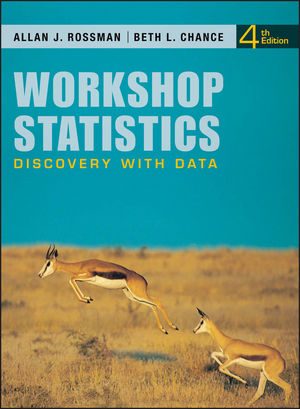
Workshop Statistics: Discovery with Data, 4th Edition
By Allan J. Rossman, Beth L. Chance
Workshop Statistics: Discovery with Data places an emphasis on collaborative learning. It requires student observation, and integrates technology for gathering, recording, and synthesizing data. The course offers flexibility in selecting technology tools for classrooms primarily using technologies other than graphing calculators or Fathom Dynamic Data software. It presents standards for teaching statistics in an innovative, investigative, and accessible way to support active learning of statistics, and uses real data sets with everyday applications in order to promote statistical literacy.
Schedule a Demo Request Instructor AccountWant to learn more about WileyPLUS? Click Here
Ready, Study and Practice
Students learn course concepts using the complete online eTextbook, flashcards, crossword puzzles, practice questions, videos, and animations. Organized by learning objective, students can filter for relevant learning resources based on what they need to study most and print any section of the eTextbook.
ORION Adaptive Practice
Every student has a different starting point, and adaptive practice provides endless opportunities for practice to effectively prepare for class or quizzes and exams. Active retrieval of information with practice questions is proven to improve retention of information better than re-reading or reviewing the material, and students who use adaptive practice to prepare for exams do significantly better than those who do not. Students begin with a quick, chapter-level diagnostic to determine their initial level of understanding, and they can use the dashboard and quick reports to see what topics they know and don’t know.
Assignments
Students who fully engage in WileyPLUS assignments do better in the course by more than a letter grade. Auto-graded assignments give students immediate feedback based on flexible assignment settings determined by the instructor, while the notification center allows students to set their own email notification policies to stay on track.
Instructors can select from extensive and reliable question banks to create and deploy reading, practice, homework, pre-post lectures, and assessment assignments. This course includes essay, label drag-and-drop, multiple choice, text entry, and true-/false question types.
Gradebook
Students know where they stand on WileyPLUS assignments, and they can track progress by learning objective.
Instructors have insights into student performance at the granular question attempt and can track trends by individual student, assignment, or learning objective. Flexible policies allow instructors to change points, set assignment weighing policies, extend individual due dates, or drop the lowest grade.
Chapter 1. Collecting Data and Drawing Conclusions
Chapter 2. Summarizing Data
Chapter 3. Randomness in Data
Chapter 4. Inference from Data: Principles
Chapter 5. Inference from Data: Comparisons
Chapter 6. Inferences with Categorical Data
Chapter 7. Relationships in Data
TABLE I Random Digits
TABLE II Standard Normal Probabilities
TABLE III t-Distribution Critical Values
TABLE IV Chi-Square Distribution Critical Values
A. Student Glossary
B. Sources for Studies and Datasets
C. List of Data Files and Applets

